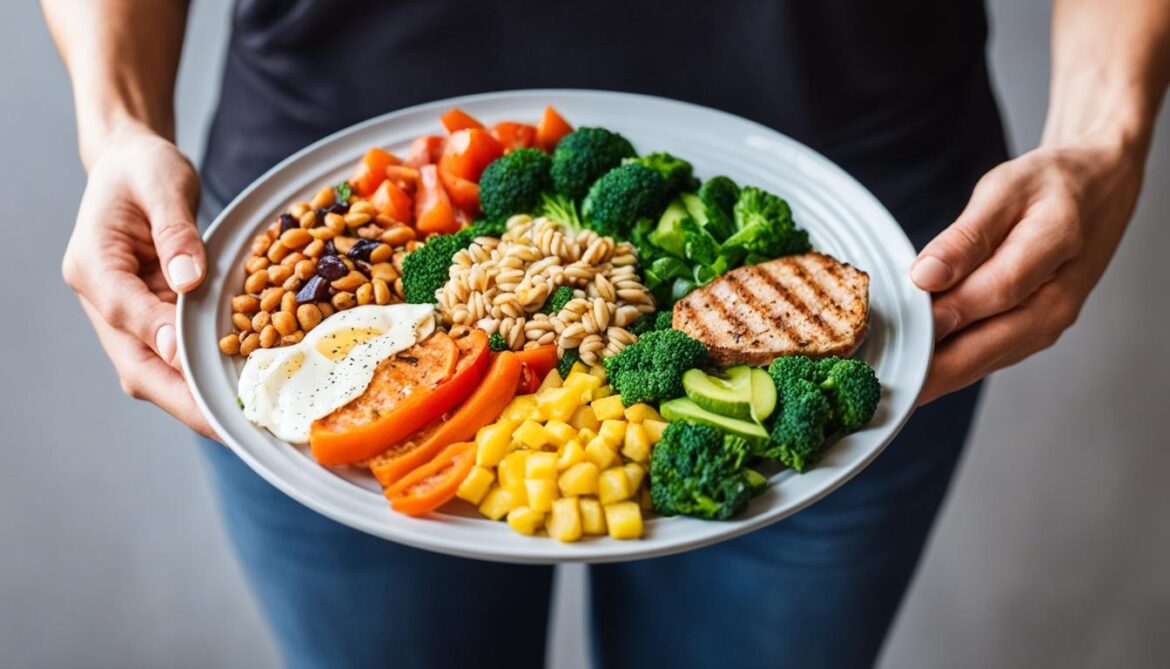When it comes to achieving weight loss success, portion control meal plans are the secret weapon. By following a balanced diet that focuses on portion sizes and mindful eating, individuals can take control of their calorie intake and make healthier food choices.
Portion control is all about managing the amount of food you eat, ensuring that you provide your body with the right amount of nutrients while limiting excess calories. By understanding portion sizes and practicing mindful eating, you can develop a healthier relationship with food and prevent overeating.
Key Takeaways:
- Portion control meal plans are essential for weight loss success
- A balanced diet and mindful eating are key components of portion control
- By tracking progress, you can make necessary adjustments to your plan and stay motivated
- Consulting a healthcare provider is important, especially if you have underlying health conditions
- Understanding your body, including hormonal changes, is crucial for personalized portion control meal plans
Consulting a Healthcare Provider and Understanding Your Body
Before embarking on any weight loss program, it is vital to consult a healthcare provider, especially if you have underlying health conditions or are taking medication. Your healthcare provider can offer valuable guidance and ensure that your weight loss journey is safe and appropriate for your individual needs.
Understanding your body is also crucial in achieving successful weight loss. Women, in particular, experience hormonal changes throughout their lives that can impact their weight. These changes occur during the menstrual cycle, pregnancy, and menopause. By considering these factors and working closely with your healthcare provider, you can develop a personalized portion control meal plan that takes into account your unique circumstances.
During the menstrual cycle, hormonal fluctuations can affect your appetite, cravings, and energy levels. It is important to be mindful of these changes and adjust your meal plan accordingly. By incorporating nutrient-dense foods, you can support your body during this time and maintain a healthy weight.
Pregnancy is another stage in a woman’s life when hormonal changes occur. Weight gain is a natural part of pregnancy, but it is important to monitor your weight and consult your healthcare provider for guidance on maintaining a healthy balance. After giving birth, your body may go through additional changes, so it’s essential to adapt your portion control meal plan to support your overall well-being.
Menopause brings about significant hormonal changes that can impact weight and body composition. During this stage, many women experience a decrease in estrogen levels, which can affect metabolism and lead to weight gain. Working closely with your healthcare provider can help you manage these changes and develop a portion control meal plan that supports a healthy weight.
“Consulting a healthcare provider and understanding your body are key components of a successful weight loss journey. By working closely with a professional and being aware of the hormone-related changes your body undergoes, you can tailor your portion control meal plan to meet your unique needs and achieve lasting results.”
Hormonal Changes Throughout a Woman’s Life
| Life Stage | Hormonal Changes | Impact on Weight |
|---|---|---|
| Menstrual Cycle | Fluctuating hormones, including estrogen and progesterone | Appetite changes, cravings, energy fluctuations |
| Pregnancy | Elevated levels of estrogen and progesterone | Weight gain as a natural part of pregnancy |
| Menopause | Decreased levels of estrogen | Metabolic changes, potential weight gain |
Understanding the impact of hormonal changes on weight can help shape your portion control meal plan and ensure that it aligns with your body’s needs at each stage of life. Remember to always consult your healthcare provider for personalized advice and guidance throughout your weight loss journey.
Importance of Exercise and Managing Stress
Regular exercise is a crucial component of achieving success in your weight loss journey. Engaging in regular physical activity not only helps burn calories but also improves metabolism and targets various fitness aspects. It is recommended to aim for at least 150 minutes of moderate exercise per week, incorporating a combination of cardio, strength training, and flexibility exercises.
“Exercise is a celebration of what your body can do. Not a punishment for what you ate.”
Cardiovascular exercises, such as running or cycling, can help elevate your heart rate and improve endurance. Strength training exercises, such as weightlifting or bodyweight exercises, help build lean muscle mass, which contributes to increased calorie burn even at rest. Flexibility exercises, including stretching and yoga, promote range of motion and improve overall mobility.
It is important to note that managing stress is also crucial for weight management. High levels of stress can contribute to emotional eating, derailing your progress towards your weight loss goals. Incorporating stress reduction techniques into your daily routine can help you maintain a healthy mindset and avoid stress-induced overeating.
Stress Reduction Techniques:
- Meditation: Take a few minutes each day to sit in a quiet space, close your eyes, and focus on your breath. Meditation can help calm the mind and reduce stress levels.
- Deep Breathing: Practice deep breathing exercises to trigger the body’s relaxation response. Inhale deeply through your nose, hold for a few seconds, and exhale slowly through your mouth.
- Engage in Hobbies: Find activities that bring you joy and help distract your mind from stress. Whether it’s painting, dancing, or playing an instrument, engaging in hobbies can be a great way to unwind and reduce stress levels.
To further enhance your understanding of the importance of exercise and stress management for weight loss, check out the following table:
| Exercise Type | Benefits |
|---|---|
| Cardiovascular Exercise | Burns calories, improves heart health, enhances endurance |
| Strength Training | Increases muscle mass, boosts metabolism, improves body composition |
| Flexibility Exercises | Increases range of motion, improves posture, reduces risk of injury |
Remember, exercise and stress management are vital components of a comprehensive weight loss plan. By incorporating regular physical activity and stress reduction techniques into your routine, you can support your overall well-being and achieve sustainable weight loss.
Importance of Quality Sleep and Hydration
When it comes to weight loss, quality sleep and proper hydration play essential roles in achieving your goals. Both factors can significantly impact hormones, hunger and satiety, appetite control, and metabolism. Let’s explore why paying attention to these aspects is crucial for your weight loss journey.
The Hormonal Connection
Getting enough sleep is not only important for your overall well-being but also for maintaining a healthy weight. Lack of quality sleep can disrupt the hormones that regulate hunger and satiety, such as ghrelin and leptin. Ghrelin, also known as the hunger hormone, increases appetite, while leptin, the satiety hormone, signals fullness. When you don’t get enough sleep, ghrelin levels rise, and leptin levels decrease, leading to increased feelings of hunger and cravings for unhealthy foods.
Aim for Seven to Eight Hours of Restful Sleep
To ensure proper hormonal balance and support your weight loss efforts, aim for seven to eight hours of restful sleep per night. Establishing a consistent sleep schedule and creating a relaxing bedtime routine can help improve the quality and duration of your sleep. Additionally, turning off electronic devices, keeping your bedroom cool and dark, and avoiding caffeine and stimulating activities before bedtime can contribute to better sleep hygiene.
The Hydration Factor
Proper hydration is another key aspect of weight loss. Water plays a vital role in appetite control and metabolism. When you’re well-hydrated, it helps regulate your appetite, making you feel fuller and aiding in portion control during meals. Additionally, staying hydrated optimizes your body’s metabolic processes, allowing it to efficiently burn calories and fat.
Aim for Eight or More Glasses of Water
To support your weight loss efforts and overall well-being, aim for eight or more glasses of water per day. While individual hydration needs may vary, this general guideline provides a baseline for adequate hydration. Keep a water bottle with you throughout the day as a reminder to stay hydrated, and consider incorporating hydrating foods such as fruits and vegetables into your meals and snacks.
By prioritizing quality sleep and maintaining proper hydration, you’re setting yourself up for success on your weight loss journey. Remember, small lifestyle changes can have a big impact, and taking care of your body through adequate rest and hydration is an important part of achieving your goals.
Benefits of Mindful Eating and Social Support
Mindful eating is a powerful tool for achieving portion control and making healthier choices. By consciously focusing on what and when you consume, you can become more aware of portion sizes and make conscious decisions about your meals. Mindful dining allows you to savor each bite, appreciate the flavors, and recognize your body’s hunger and fullness cues.
One effective method to support mindful eating is by keeping a food journal. By recording your meals, snacks, and beverages, you can gain valuable insights into your eating patterns, identify areas for improvement, and track your progress towards your weight loss goals. Alternatively, using a mobile application designed for tracking meals, exercise, and weight loss progress can provide convenient tools for portion control and adjustment to your plan as needed. These digital resources often include features such as calorie counters, meal planners, and progress trackers, helping you stay on track and make informed decisions about your food choices.
The power of social support
Having a strong social support network is crucial for weight loss success. Whether it’s through friends, family, or a weight loss support group, having the support of others on your journey can provide motivation, accountability, and encouragement.
Joining a weight loss support group or engaging with like-minded individuals who are also committed to losing weight can offer valuable insights, shared experiences, and a sense of camaraderie. These support groups often provide a safe space to discuss challenges, celebrate victories, and exchange helpful tips and strategies. The collective knowledge and encouragement from others can keep you motivated, help you stay committed to your goals, and provide guidance on maintaining a healthy lifestyle in the long term.
Remember, sustainable weight loss is about more than just the food we eat. It involves making positive lifestyle changes and fostering a supportive environment to achieve long-term success. By practicing mindful eating techniques and seeking social support, you can enhance your weight loss journey and achieve your desired results.
| Benefits of Mindful Eating and Social Support | |
|---|---|
| 1 | Improved portion control |
| 2 | Enhanced awareness of hunger and fullness cues |
| 3 | Opportunity to make healthier food choices |
| 4 | Greater accountability and motivation through a food journal or mobile application |
| 5 | Access to a supportive community for guidance and encouragement |
Embrace the benefits of mindful eating and tap into the power of social support as you embark on your weight loss journey. Together, these strategies can enhance your portion control efforts, empower you to make healthier choices, and provide the necessary encouragement and guidance for long-term success.
Conclusion
Achieving and maintaining a healthy weight requires a holistic approach that encompasses various aspects of life. Throughout the weight loss journey, incorporating lifestyle changes like portion control meal plans, balanced nutrition, regular exercise, quality sleep, hydration, and mindful eating is crucial for sustainable weight loss. By taking a personalized approach and finding a plan that aligns with your preferences and needs, you can set yourself up for long-term success.
Remember that there is no one-size-fits-all solution when it comes to weight loss. It’s important to understand that each individual’s body and lifestyle are unique, and what works for someone else may not work for you. By building a strong support network and surrounding yourself with people who motivate and inspire you, staying on track becomes easier.
Setting realistic goals is also key to staying motivated and avoiding disappointment. Celebrate small victories along the way to keep yourself motivated. Reflect on how far you have come and use that as fuel to continue your weight loss journey. Remember, sustainable weight loss is about making lifestyle changes that you can maintain in the long run, rather than resorting to quick fixes or fad diets.
In conclusion, by taking a holistic approach, making sustainable lifestyle changes, and following a personalized plan, you can achieve and maintain a healthy weight. Focus on nourishing your body, being consistent with exercise, getting quality sleep, staying hydrated, and being mindful of your eating habits. With dedication and perseverance, you can embark on a successful weight loss journey and enjoy the benefits of a healthier and happier life.
FAQ
What is the importance of portion control meal plans?
Portion control meal plans are crucial for achieving weight loss success. By following a balanced diet that includes ample protein, healthy fats, and fiber, individuals can ensure they are nourishing their bodies while limiting calorie intake. Portion sizes play a significant role in calorie restriction and can be managed through measuring devices or visual indicators.
How can mindful eating aid in portion control?
Practicing mindful eating and being aware of what and when you consume can aid in portion control and the ability to make healthier food choices. By focusing on what and when you eat, you become more aware of portion sizes and make conscious decisions about your meals.
Why is it important to consult a healthcare provider before starting a weight loss program?
It is essential to consult a healthcare provider before starting any weight loss program, especially if you have underlying health conditions or are taking medication. Understanding your body is vital in achieving successful weight loss as hormonal changes throughout the menstrual cycle, pregnancy, and menopause can impact weight.
How can exercise and stress management contribute to weight loss?
Regular exercise, including a combination of cardio, strength training, and flexibility exercises, is crucial for weight loss success. Exercise helps burn calories, improve metabolism, and target various fitness aspects. Managing stress is also important, as high levels of tension can lead to emotional eating. Incorporating stress reduction techniques such as meditation, deep breathing, and engaging in hobbies can help maintain a healthy mindset and avoid stress-induced overeating.
What is the impact of quality sleep and hydration on weight loss?
Quality sleep is crucial for weight loss as insomnia can disrupt the hormones that regulate hunger and satiety, leading to weight gain. Aim for seven to eight hours of restful sleep per night to ensure proper hormonal balance. Hydration also plays a key role in weight loss, as it aids in appetite control and enhances metabolism. Aim for at least eight glasses of water per day to stay hydrated and support your weight loss efforts.
How can mindful eating and social support contribute to weight loss?
Mindful eating is a powerful tool for portion control and making healthier food choices. By focusing on what and when you consume, you become more aware of portion sizes and make conscious decisions about your meals. Keeping a food journal or using a mobile application to track your meals, exercise, and weight loss progress can support portion control. Additionally, having a strong social support network, whether it’s friends, family, or a weight loss support group, can provide motivation, accountability, and encouragement on the weight loss journey.
What is the importance of a holistic approach to weight loss?
Achieving and maintaining a healthy weight requires a holistic approach that encompasses various aspects of life. By following portion control meal plans and incorporating balanced nutrition, regular exercise, quality sleep, hydration, and mindful eating, individuals can set themselves up for weight loss success. Building a strong support network and setting realistic goals are also crucial for staying motivated and avoiding disappointment. It’s important to find a personalized plan that aligns with your preferences and needs to ensure sustainable weight loss.
Source Links
- https://indianapolis32.heatherridercoaching.com/web-stories/the-female-guide-to-effective-weight-loss/
- https://weightloss1.muragon.com/entry/7.html
- https://www.keralanews247.com/why-am-i-not-losing-weight-on-wegovy/



